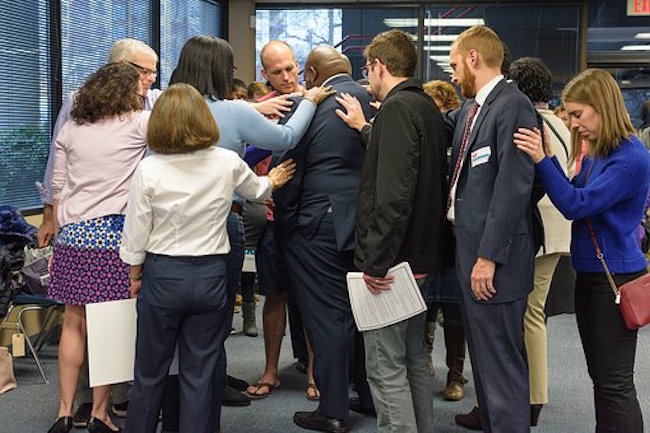What If Charity Replaced Taxation? by Jean Vilbert via Alt-Market
GNN Note – When I was a child government didn’t provide welfare like it does today. The churches, community organizations and people helping people was the norm. It was a hand up not a hand out.
When I was born my parents were living in what is known today as Section 8 housing – government subsidized. My dad was a fireman and my mom worked part time at the hospital. We, my parents and older brother, moved into a cracker-box house, 864 square feet, before I was 1 year old. My younger brother would be born in that house approximately 17 months later. 5 people in a 2 bd, 1bath 864 square foot house – living like royalty!!
When I talk about brokenness and poverty it comes the reality of my life, not a story I heard or a book I read.
******
Health care. Education. Among others, these goods have been considered so important that most current governments make a huge effort to provide them to people with inadequate incomes. Surely, it would be crazy to deny how important these goods are. In a 2016 survey conducted by Indiana University-Purdue University Indianapolis (IUPUI) titled “The 2016 US Trust Study of High Net Worth Philanthropy,”We will set here an audacious premise: Private entities sponsored by charity are normally more effective than public entities. Individuals were asked to select the public policy issues that mattered most to them. The top two issues were precisely health care (29 percent) and education (28 percent).
However, is publicization through state activity the only or best way to provide those services to the poor? Do we have alternatives? How about charity? Couldn’t charity replace taxation? It could—and with solid advantages.
There are four main reasons why this is the case: moral, political, financial, and psychological.
Let Us Start with a Moral Plea
Are taxes so different from charity? Well, pulling out our wallet to donate money to a non-government organization (responsible for offering health or education) is different than opening our pockets for the revenue guys who threaten us: “If you don’t pay your taxes, you will end up in prison!” We have here a strong moral difference between a forced act and a voluntary act: taxation is coercion, while charity is benevolence.
In fact, rich countries that adhere to a welfare state model and (of course) high taxation are not the most generous ones. According to rankings from the Organization for Economic Cooperation and Development (OECD), France has the highest tax-to-GDP ratio in the world (46.2 percent), followed by Denmark (46 percent) and Belgium (44.6 percent).
When we check the Charities Aid Foundation (CAF) World Giving Index, France is 72nd on the list of generosity, Denmark is 24th, and Belgium is 39th. On the other hand, Ireland’s tax-to-GDP ratio is 22.8 percent, and the United States is 27.1 percent. Ireland is fifth on the CAF World Giving Index, and the United States is fourth. Interesting, isn’t it?
Next, We Can Wield a Political Plea
There is an enormous risk in allowing the expansion of the state’s forces, even when we are talking about areas as important as health care and education.
Public education opens a highway to the imposition of cultural hegemony through indoctrination. If education is provided by several independent entities (sponsored by charity), it is harder to control it. The government gains the power to tell us what to eat and drink, how to ride or drive, what we can do or not, and more.
But when education is centralized in the state’s hands (afforded by taxes), it easily becomes an ideological apparatus, making the dreams of Antonio Gramsci and Louis Althusser come true.
Once public forces take the responsibility for providing health care, life is made subject to explicit calculations of state power, featuring what Michel Foucault and Giorgio Agamben called biopower or biopolitics: Life itself becomes an object of concern for power. As a result, individuals see the demise of any boundaries against public intervention in their lives. The government gains the power to tell us what to eat and drink, how to ride or drive, what we can do or not, and more.
It Takes Us to a Financial Plea
We will set here an audacious premise: Private entities sponsored by charity are normally more effective (they are cheaper or have a better cost-benefit profile) than public entities. They can do the same with fewer resources.
For example, in Brazil, we have public and private universities. Research shows that a student in a Brazilian private university costs 60 percent less than in a public university. Maybe poor countries could do more with less money if they invested in the private sector and thought about how to promote charity instead of relying only on public services and taxation.




